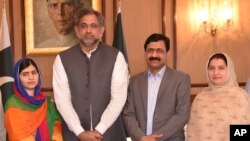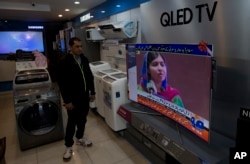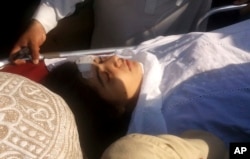Nobel laureate Malala Yousafzai returned Thursday to her native Pakistan, nearly six years after she was shot by Islamist militants in her northwestern home district of Swat for advocating female education.
The 20-year-old global education activist met with Prime Minister Shahid Khaqan Abbasi just hours after landing in Islamabad.
“I still can’t believe that this is actually happening,” Malala later told a specially organized gathering at the prime minister’s office where senior officials, cabinet members, lawmakers, civil society activists and young students were in attendance.
In an emotional speech broadcast live by television stations, Malala said she had dreamed of returning to Pakistan and setting foot on her native soil.
“It is the happiest day of my life that I have come back to my country and standing on my native soil after more than five-and-a-half years,” she said before breaking down into tears. “Whenever I travel in a plane, car I see the cities of London, New York and I was told that just imagine this is Pakistan, imagine that you are traveling in Islamabad, imagine that your are in Karachi. And it was never true. But now today I see I am here. I am extremely happy."
Malala was returning home from school in October 2012 when masked gunmen intercepted her school van and shot her in the head.
The young girl sustained several skull injuries and after receiving emergency treatment at a Pakistan army hospital, she was flown to Britain to undergo surgery.
The outlawed Pakistani Taliban claimed responsibility for plotting the attack and vowed to target her again. The group justified its action, accusing Malala of promoting western culture.
Malala has since been living in Britain and studying at Oxford University. She is the co-founder of the Malala Fund helping girls receive secondary education in conflict-hit countries, including Syria, Kenya, Nigeria, Jordan and Pakistan.
The Malala Fund champions every girl’s right to 12 years of free, safe and quality education. Malala began speaking out at the age of 11 for girls’ education in her largely conservative home district.
Malala said that though she was just 20 years-old she has already gone through too many challenges, but added she had never thought of leaving Pakistan.
“From growing up in the beautiful Swat valley, to then seeing extremism and terrorism in 2007 till 2009, and then seeing how many difficulties women and girls face in our society and how we can fight those challenges," she explained, "and then the attack on me taking place, leaving my own country. Everything was just happening itself like you could not control anything.”
Her critics, mostly Islamist fundamentalists at home, saw the Malala shooting as stage-managed by Western powers campaigning to malign Pakistan.
In her speech Thursday, the young activist emphasized the need to educate Pakistani girls, saying her organization has already spent more than $6-million in girls’ education.
Malala urged Pakistanis to join her in the mission to economically empower women for a “better” future of her country.
She has used her Nobel Prize money to build a girls’ school in Swat which was inaugurated earlier this month. Local media speculated she might visit the school.
Swat used to be a stronghold of the militants where they had blown up girls’ schools and imposed their harsh interpretation of Islamic law, or sharia until a major military operation flushed them out of the scenic valley in 2009.
Prime Minister Abbasi said he was extremely happy to welcome a daughter of the Pakistan nation who has earned massive fame and respect from the entire world, has come back home.
“You are the most famous citizen in the history of Pakistan. The world has honored you and Pakistan will also do so.…It is your home. You are no more an ordinary citizen and your security is now also our duty,” Abbasi said.
The prime minister went on to say that terrorism was at its peak in Pakistan in 2012 when Malala also became a victim and left the country. But Pakistani security forces, he added, have since effectively tackled the challenge.
“We have fought a difficult war in which 6,500 soldiers, 25,000 policemen, paramilitary forces and civilians embraced martyrdom,” Abbasi noted.
These sacrifices as part of ongoing anti-terrorism operations in Pakistan have established peace in the country and eliminated terrorism, Abbasi said.






